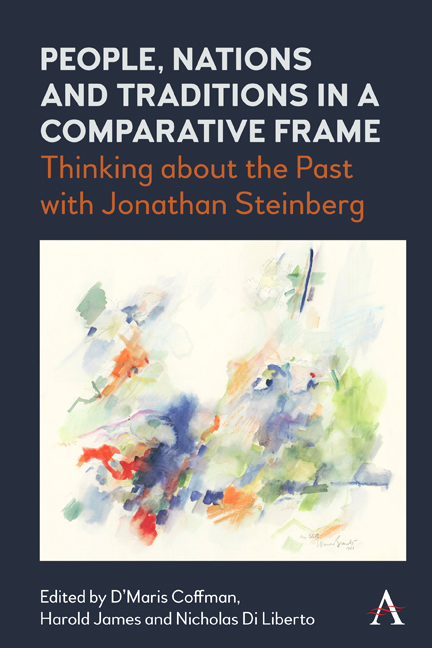 People, Nations and Traditions in a Comparative Frame
People, Nations and Traditions in a Comparative Frame Book contents
- Frontmatter
- Contents
- Foreword
- Acknowledgements
- Notes on Contributors
- Introduction
- Part One Methodological Pluralism and New Applications
- Part Two Personal and National Character
- Part Three Society, Families and the Sovereign Self
- Part Four History Out of Sync: Modernity and Tradition
- Part Five History, Narrative and the Human Condition
- Afterword
- Bibliography of Jonathan Steinberg’s Works
- Index
Chapter Twelve - A Risorgimento Influence on the Modern European Image of St Francis of Assisi
Published online by Cambridge University Press: 23 February 2022
- Frontmatter
- Contents
- Foreword
- Acknowledgements
- Notes on Contributors
- Introduction
- Part One Methodological Pluralism and New Applications
- Part Two Personal and National Character
- Part Three Society, Families and the Sovereign Self
- Part Four History Out of Sync: Modernity and Tradition
- Part Five History, Narrative and the Human Condition
- Afterword
- Bibliography of Jonathan Steinberg’s Works
- Index
Summary
The nineteenth-century revival of interest in St Francis of Assisi, sparked by romantic views of the Catholic Middle Ages and new developments in historical methods, peaked in 1894 with the biography Vie de S. François d’Assise by Paul Sabatier (1858–1928), a French Protestant. This work bequeathed to fin-de-siècle Europe the image of St Francis as the apostle of religious liberty. Its many editions in French, as well as rapid translations into English, German, Swedish and Italian, indicate widespread interest in this image of the saint. In the scholarly realm, Sabatier's work became the starting point for nearly every critical discussion of St Francis during the twentieth century. More recent scholarship attests to the landmark status and enduring influence of Sabatier's interpretation of St Francis. Considering the extent to which Sabatier shaped the modern European image of St Francis, it is interesting to note the influence of the Risorgimento figures Ruggiero Bonghi (1826–1895) and Antonio Rosmini (1797–1835) on Sabatier's interpretation of the saint. Their lives and works, reflecting Risorgimento values, became an important influence on Sabatier during the Modernist Crisis of the Catholic Church in the early 1900s. At that time, Sabatier drew upon an earlier Franciscan biography by Bonghi, whose spiritual development in the 1850s had been guided by Rosmini, in order to modify his image of St Francis as an apostle of religious liberty. Sabatier now showed the saint as having been exceedingly Catholic, fully human and essentially Italian, thereby creating a St Francis that could be used to defend early twentieth-century reformers within the church.
Sabatier's work was initially praised by the ultimate Vatican authority. Pope Leo XIII (1878–1903) had developed a special veneration for the holy man of Assisi during his 32 years as bishop of nearby Perugia. He used the occasion of the 700th anniversary of the birth of St Francis in 1882 to encourage Catholics of all ranks and both sexes to combat social evils by enrolling in the Franciscan Third Order and practising the Franciscan form of Christian spirituality. Leo XIII believed this would help quell revolutionary impulses and social hatreds that were, in his words, ‘the beginnings and the weapons of socialism’. Deeply concerned with the growing divide between rich and poor in late nineteenth-century Europe, this pope proclaimed rights and duties of capital and labour in the encyclical Rerum Novarum (1891).
- Type
- Chapter
- Information
- People, Nations and Traditions in a Comparative FrameThinking about the Past with Jonathan Steinberg, pp. 179 - 186Publisher: Anthem PressPrint publication year: 2021


